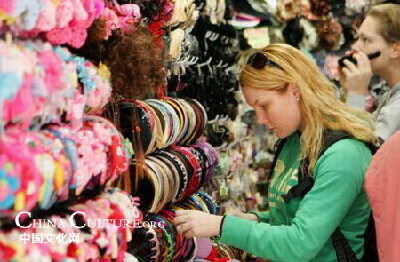Xiushui Street or Silk Market, is a must-go shopping destination for foreign tourists in Beijing. And it is in the process to shaking off an image of paradise for counterfeit brand products, as China strengthens its efforts to better protect intellectual property rights.
The market, though not very big or high-end, is so famous among visitors that it was branded as a tourist destination eponymous to the Great Wall and the Forbidden City according to tourist guidebooks.
And it is expecting to embrace a business boom as hundreds of thousands of tourists will flock to Beijing to watch the Olympic Games.

Customers shop at the Xiushui Street market.
Abigail Alvarado from Ecuador is one of the market's many customers wandering around between the bustling aisles flanked by stalls.
"I bought chopsticks, slippers made of silk, and some handicrafts," she said, carrying several bags in hand. "I haven't looked at the clothes yet."
Alvarado is just one of nearly 50,000 customers at Xiushui every day, of whom 80 percent are foreigners, according Wang Zili, general manager of the market.
Chinese vice premier Wang Qishan noted Xiushui Street as an example of China's progress in IPR protection in an interview with The Wall Street Journal in mid-June, during his staying in the United States for the fourth China-US Strategic Economic Dialogue.
Better known as the Silk Market among foreigners, the shopping center has shifted its marketing strategy from just selling fake brands to promoting Chinese culture and lifestyle.
"On every Beijing-bound international flight there are Xiushui Street customers," said Wang, in his office on the top floor of the six-storey building adjacent to Beijing's booming central business area.
According to Wang, Xiushui has a three-decade history in accordance with China's opening up and policy change towards free market economy, but it was not until 1995 that large numbers of fake products began to dominate this market. It suffered a setback when China started to fight hard against IPR infringement in recent years.
In early 2005, the old market, which was in fact stalls in makeshift buildings, was torn down and reconstructed to a brand new store with improved facilities. The upgrade helped increase business as it attracted many traditional Chinese brands to open chain stores in there, including clothes, shoes, and drug stores with centuries of history.
However, management only started to take IPR protection seriously from April 2006 when five international manufacturers sued vendors in Xiushui for selling replicas of their products. The lawsuit ended up with the court ruling that the vendors and the market must pay 20,000 yuan in compensation to each of the five brands.